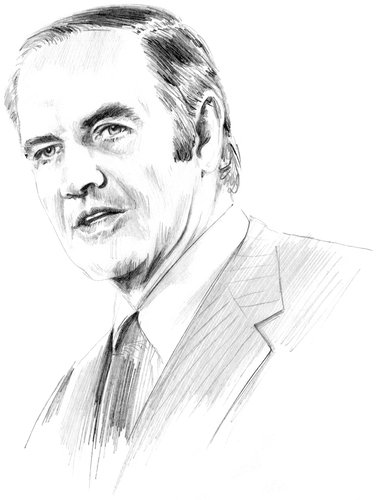George McGovern
22/10/12 04:26

But there was a sense that things could change. People believed that their votes would make a difference. And there was a stark contrast in political philosophy between the candidates in 1972. The polls were clear. President Nixon was headed toward a landslide political victory. But I was young and idealistic. And I was captivated by the candidate from South Dakota who seemed so much like my father. George McGovern, like my father, had been a bomber pilot in World War II. Like my father that war had made him question war as a tool for international relationships. McGovern had studied theology after the war before becoming involved in public service. My father had a lifelong passion for religion and theology even though he never pursued those topics professionally. McGovern spoke of a different way of leading and called us to lives of service.
I voted. He lost the election. I have been diligent in voting ever since, never missing a presidential election. I’ve voted for those who won and those who lost over the years. I have never lost the sense that it is important to vote regardless of the winds of politics. I like to think that my political judgments are largely unswayed by the millions of dollars spent on advertising. I can make up my own mind how to vote and I prefer to do my own research.
The story that unfolded after McGovern lost the election is now part of our history. President Nixon resigned in disgrace after scandal rocked his administration. We were shocked at the foul language that was revealed in the tapes. We were shocked at the depth of the lies we had been told. I don’t think that we would be shocked any more. We have since grown very cynical about our leaders, about politics, and about government.
Despite all of that, George McGovern continued to be an integrity. He lost another important election, in 1980, running for this fourth term as US Senator. It was the beginning of a different time in US politics. Prior to that race, those of us who lived in small population states felt that we had control of our own election processes. In 1980 so many out-of-state dollars flowed into the election in many states that we have since known that powerful out-of-state interests invest far more in our local politics than we could ever afford. Every US Senate race in South Dakota since that time has been fueled by lots of money from other states. We’d like to believe that our votes are not for sale, but the truth is that buying a senator in South Dakota costs less than buying one in California and there are a lot of people who are willing to spend millions to buy a US senator, and virtually every senator owes favors to those who contributed to election campaigns.
In the midst of the rough and tumble and sometimes unfair realities of politics, however, George McGovern continued to believe in and work for the good of people. Some of his most important life’s work came from the phase after he lost the run for President. In the 1970’s, McGovern worked diligently on the Senate Hunger and Human Needs Committee, reforming the Food Stamp Program, expanding the school lunch program and establishing the Special Supplemental Program for Women, Infants, and Children. After losing his seat in the senate, McGovern continued to work to end hunger.
In 1998, after I had become a South Dakotan, President Clinton named George McGovern ambassador to the United Nations Food and Agriculture Organization. George McGovern went to work to strengthen global school feeding, nutrition and education programs. He continued to author legislation and to work with members of both political parties to provide leadership to our country. Long after both men had put their political aspirations behind themselves, he worked with Bob Dole to propose a program to provide poor children with meals at schools in Africa, Asia, Latin America and Eastern Europe. The 2002 McGovern-Dole International Food for Education and Child Nutrition Program was signed into law in 2002 by President George W. Bush and has provided meals to 22 million children in 41 countries.
“Whatever you did unto one of the least of these, you did unto me.”
There will be plenty of obituaries and eulogies and op-ed pieces written about George McGovern. There may not be much that I can add to the flood of words. But there is a lesson that I have learned from the life of George McGovern that I hope I can pass on to my children and grandchildren: Win or lose, don’t give up on your principles and values. George McGovern never gave up on his principles. He never gave up in his determination to call our nation to a higher plain. He never gave up on his commitment to serve others and to defend the most vulnerable. George McGovern never became president of our nation, but our nation is far better because of what he did. He served is country well.
“The first shall be last and the last shall be first.” History will remember George McGovern well.
His family has asked that we, instead of sending flowers or other tributes, express our support for them in this time of grief by contributing to organizations that are working to end world hunger. It is a grand gesture, and Susan and I have decided to make our memorial gift to Bread for the World. It is another lesson to learn from a wise man: Feeding hungry children is far better than winning an election any day.